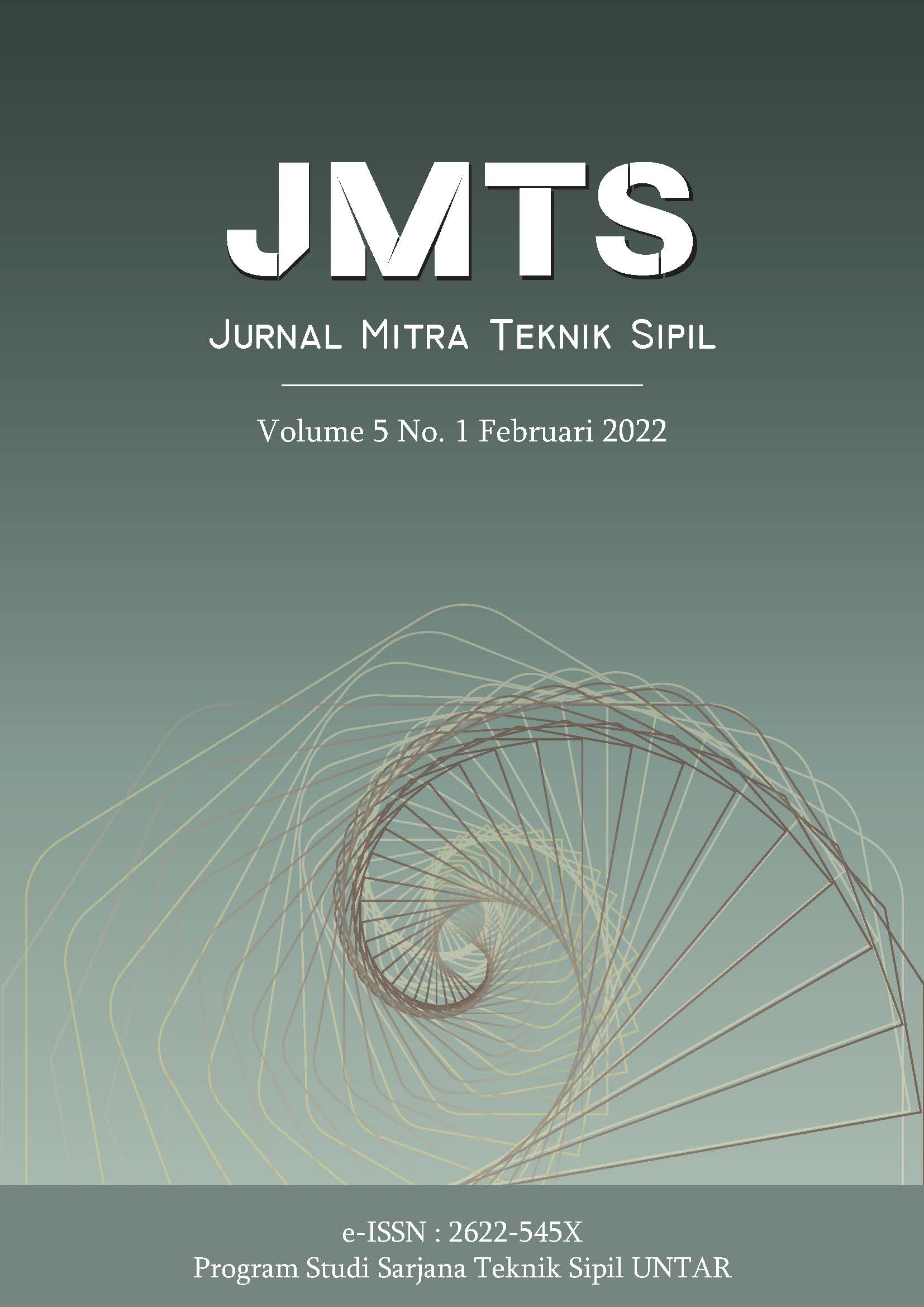PENJADWALAN PROYEK PERUMAHAN X DI TANGERANG SELATAN DENGAN METODE LINE OF BALANCE DAN EFEK PEMBELAJARAN
Main Article Content
Abstract
ABSTRACT
Repetitive projects are construction projects with activities that are repeated in the same unit. The most suitable method for repetitive projects is Line of Balance method, this method can determine and allocate the necessary resources for each activity so deadline can be achieved. Learning Effects on LOB method have the advantage of speeding up the duration of an activity and reducing the total resource requirements of workers. Learning Effect can be calculated mathematically with a Log Linear learning curve. Object of this research is the housing project X in South Tangerang with a total of 11 houses and duration to complete is 364 days. LOB method takes 350 days to complete and speeds up the duration by 3,85%, LOB method with learning effect will speed up the duration by 9,05% to 331,1 days. Total man days needed according to the initial data is 19.480 man days, same as if using LOB method, but with the learning effect it will reduce the number of man days by 22,28% to 15.530 man days. LOB method with learning effect can accelerate the duration of development and reduce the number of man days so this method can be considerate in compiling a repetitive schedule.
Keywords: repetitive; line of balance; learning effect; log-linear learning curve, man days.
ABSTRAK
Proyek repetitif adalah proyek konstruksi dengan aktivitas yang diulang pada unit yang sama. Metode yang paling cocok untuk proyek repetitif adalah metode Line of Balance, metode ini dapat menentukan dan mengalokasikan sumber daya yang diperlukan untuk setiap aktivitas sehingga batas waktu dapat tercapai. Efek Pembelajaran pada metode LOB mempunyai kelebihan untuk mempercepat durasi suatu aktivitas dan mengurangi total kebutuhan sumber daya pekerja. Efek pembelajaran dapat dihitung secara matematis dengan kurva pembelajaran tipe Log Linear. Objek penelitian ini adalah proyek perumahan X di Tangerang Selatan dengan total 11 unit rumah dan lama pengerjaannya yaitu 364 hari. Metode LOB memerlukan waktu 350 hari untuk menyelesaikan dan mempercepat durasi sebesar 3,85%, metode LOB dengan menerapkan efek pembelajaran akan mempercepat durasi sebesar 9,05% menjadi 331,1 hari. Total man days yang dibutuhkan menurut data awal adalah 19.480 man days sama dengan kalau menggunakan metode LOB, tetapi dengan efek pembelajaran akan mengurangi jumlah man days sebanyak 22,28% menjadi 15.530 man days. Metode LOB dengan menerapkan efek pembelajaran dapat mempercepat durasi pembangunan dan mengurangi jumlah man days sehingga metode ini dapat dijadikan pertimbangan dalam menyusun jadwal repetitif.
Kata kunci: repetitif; line of balance; efek pembelajaran; kurva pembelajaran log linear, man days.
Article Details
Section
References
Arditi, D., Tokdemir, O. B., & Suh, K. (2001). Effect of Learning on Line of Balance Scheduling. International Journal of Project Management, 19(5): 265–277.
Aulia, M. A., Farisi, A. H., Wibowo, M., & Hidayat, A. (2016). Analisis Penggunaan Metode Penjadwalan Line of Balance pada proyek konstruksi repetitif. Jurnal Karya Teknik Sipil, 211-219.
Chan, A. P., Scott, D., & W.M.Lam, E. (2002). Framework of Success Criteria for Design/Build Projects. Journal of Construction Engineering and Management, 18(3): 120-128.
Harris, F., McCaffer, R., & Edum-Fotwe, F. (2013). Modern Construction Management, 7th Edition. Wiley-Blackwell.
Ja?kowski, P. (2015). Repetitive Construction Processes Scheduling. Budownictwo i Architektura, 14(2):055-061.
Pai, S. K., Verguese, P., & Rai, S. (2013). Application of Line of Balance Scheduling Technique (LOBST) for a Real Estate Sector. International Journal of Science, Engineering and Technology Research (IJSETR) Volume 2, Issue 1, 82-95.
Tokdemir, O. B., Erol, H., & Dikmen, I. (2019). Delay Risk Assessment of Repetitive Construction Projects Using Line-of-Balance Scheduling and Monte Carlo Simulation. Journal of Construction Engineering and Management, 145(2): 04018132.
Zhang, L., Zou, X., & Kan, Z. (2014). Improved Strategy for Resource Allocation in Repetition Projects Considering the Learning Effect. Journal of Construction Engineering and Management, 140(11): 04014053.

